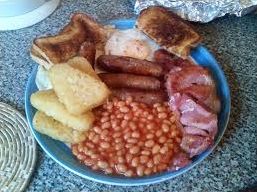| Simple Past | Present Perfect Simple |
|---|---|
irregular verbs: see 2nd column of irregular verbs
|
irregular verbs: form of 'have' + 3rd column of irregular verbs
|
regular verbs: infinitive + ed
|
regular verbs: form of 'have' + infinitive + ed
|
| Exceptions | |
Exceptions when adding 'ed':
| |
See also explanations on Simple Past and Present Perfect Simple
Use
In British English, the use of Simple Past and Present Perfect is quite strict. As soon as a time expression in the past is given, you have to use Simple Past. If there are no signal words, you must decide if we just talk about an action in the past or if its consequence in the present is important.
Note that the following explanations and exercises refer to British English only. In American English, you can normally use Simple Past instead of Present Perfect. We cannot accept this in our exercises, however, as this would lead to confusions amongst those who have to learn the differences.
Certain time in the past or just / already / yet?
Do you want to express that an action happened at a certain time in the past (even if it was just a few seconds ago) or that an action has just / already / not yet happened?
| Simple Past | Present Perfect Simple |
|---|---|
certain time in the past
|
just / already / not yet
|
Certain event in the past or how often so far?
Do you want to express when a certain action took place or whether / how often an action has happened till now?
| Simple Past | Present Perfect Simple |
|---|---|
certain event in the past
| whether / how often till now
|
Emphasis on action or result?
Do you just want to express what happened in the past? Or do you want to emphasise the result (a past action's consequence in the present)?
| Simple Past | Present Perfect Simple |
|---|---|
Emphasis on action
|
Emphasis on result
|
Signal Words
| Simple Past | Present Perfect Simple |
|---|---|
|
|
Exercises on Simple Past and Present Perfect Simple
- Certain time in the past or just / already / yet: Exercise 1, Exercise 2
- Certain event in the past or how often so far: : Exercise 3, Exercise 4
- Emphasis on action or result: Exercise 5, Exercise 6
- Mix: Exercise 7, Exercise 08
- Exercise on the text Grand Canyon
- Exercise on the text Edinburgh

